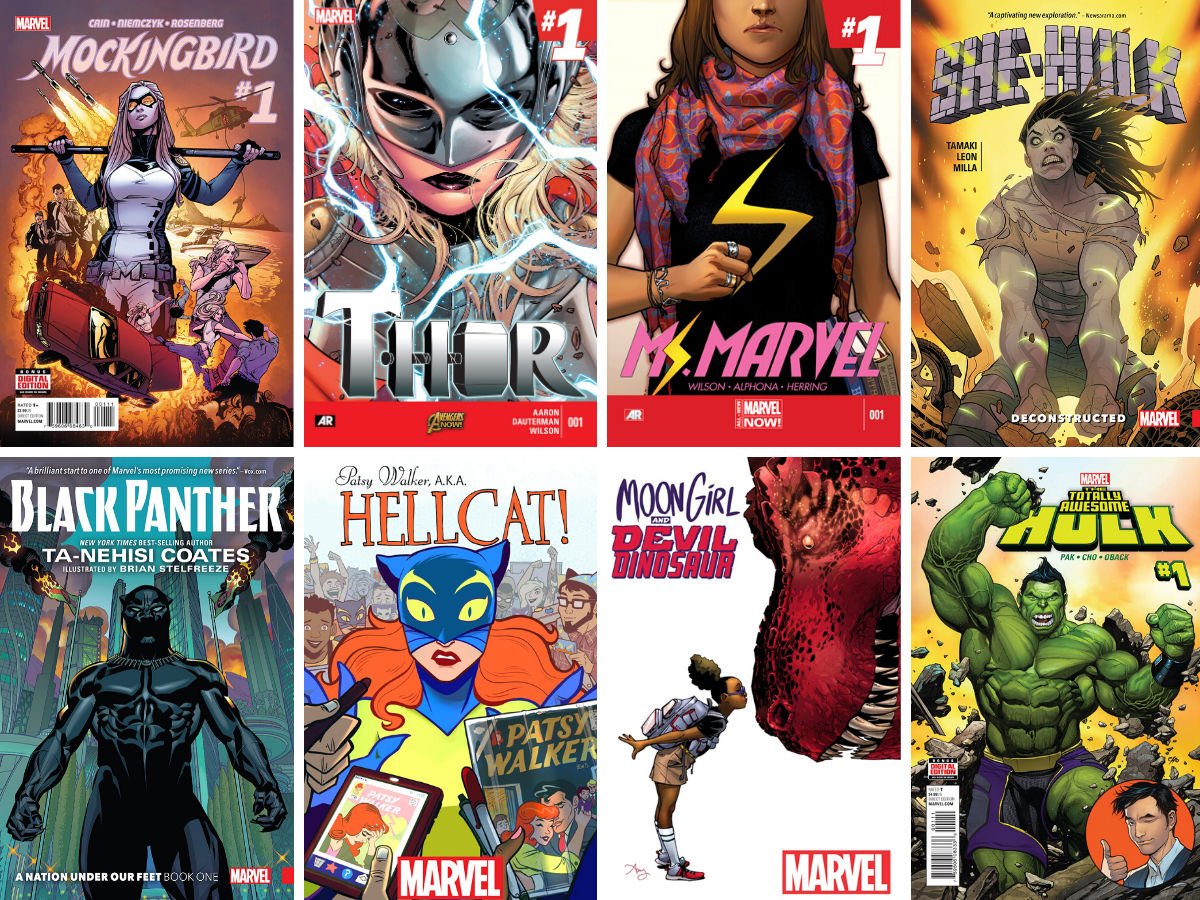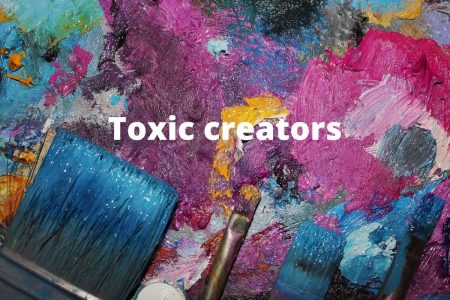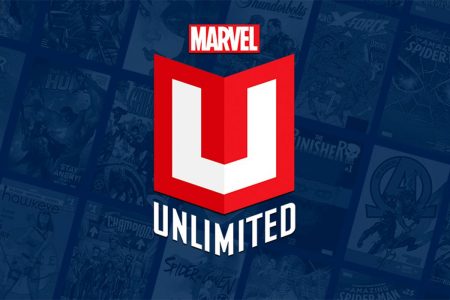The headline for this post is supposed to cover both meanings, i.e. ‘What is wrong with having diversity in comics that people complain about it?’ and ‘What’s wrong with the diversity in comics that the books are getting cancelled?’, which probably doesn’t come across in text. I am Over-Explaining Man.
The two reasons for this are the lovely Christmas present from Marvel of cancelling eight books that were mostly about or created by women/people of colour/LGBTQ and the furore of last April due to comments by Marvel’s SVP of Sales and Marketing David Gabriel (perhaps misread), where he said ‘What we heard was that people didn’t want any more diversity. They didn’t want female characters out there.’
Now, I should point out some caveats before I start talking about this. Firstly, I’m a cis hetero white middle-aged man. Secondly, despite reading comic books for over 30 years, I don’t buy any Marvel comics books on a Wednesday because they’re too expensive (see here and here and here for examples). Thirdly, I am not completely immersed in the up-to-date world of comic books so this might seem behind the times.
The first point to make is that I believe that diversity in comic books is a great thing, if not an essential thing, and I can’t understand why this is a problem. I’ve been reading a lot of comics books over 30 years, and there are so many times that you can see the same story with the same white guy (written by a white guy) doing the same thing. I love comic books so I love seeing new things, about new characters told from the new perspectives of people who are not straight white men. How can you expand your horizons with such a limited menu? Why wouldn’t you want variety?
I’ve been reading a lot of trade collections of Marvel books featuring diverse characters and it’s been fantastic. Ms Marvel – the story of a female teenage Muslim Pakistani American with superpowers coping with everything that entails – is fascinating, and Kamala Khan is a great character. In fact, the increase in solo books for female characters with female creators has been great – Chelsea Cain was writing a funny, smart, entertaining Mockingbird book (before it was cancelled and she quit Twitter because of all the harassment from ‘comic book fans’); Patsy Walker AKA Hellcat! by Kate Leth and Brittney Williams was a delightful book with a different perspective on being a superheroine and super-cute art (and the best trade collection title ever: Hooked On A Feline); the recently cancelled She-Hulk by Mariko Tamaki was a very intriguing take on the character; Unbeatable Squirrel Girl is an adorable indie book masquerading as a mainstream Marvel book; Moon Girl and Devil Dinosaur is another delightful book that does something different with an existing intellectual property. The most successful of the solo books about women, Jane Foster as Thor, is an absolute blast and does something different with the mythology. I don’t understand why people who say they love comic books don’t want more great comic books just because they’re either by or about ‘girls’. It’s ludicrous.
The other aspect is books about or by people of colour. I mentioned Ms Marvel, which is fortunately still going; also still going is the very enjoyable Totally Awesome Hulk, with the Korean American Amadeus Cho (written by his co-creator, Greg Pak); Black Panther by Ta-Nehisi Coates has been a fascinating look at the politics and culture of a unique country and what it means for a superhero who is also a king (I haven’t been able to read the spin-off series, Black Panther & The Crew and Black Panther: World Of Wakanda, because they were cancelled after six issues); Nighthawk by David Walker and Ramon Villalobos was a smart, entertaining and interesting comic book that was cancelled after six enjoyable issues – Walker took some of the characters into his next book, Occupy Avengers, which was entertaining but also cancelled after nine issues, and I was looking forward to Walker’s take on Luke Cage, but I probably won’t get the chance because it’s been cancelled due to poor sales.
(I should point out that DC’s record of diversity isn’t much better, but I’ve mostly been reading Marvel books; I did read Doctor Fate by Paul Levitz and Sonny Liew, which was a great little read that updated the character to that of an Egyptian American med student, something far more appropriate to the concept.)
 There has been a lot of talk about the nature of the books being cancelled by Marvel and its correlation with the characters/creators (e.g. Joe Glass at Bleeding Cool or Charles Pulliam-Moore at io9.com). Side note: Marvel doesn’t cancel titles – the omission of a title in the solicitations provided three months in advance is confirmed as cancelled by the writers on Twitter, because Marvel doesn’t want to make it official at the time.
There has been a lot of talk about the nature of the books being cancelled by Marvel and its correlation with the characters/creators (e.g. Joe Glass at Bleeding Cool or Charles Pulliam-Moore at io9.com). Side note: Marvel doesn’t cancel titles – the omission of a title in the solicitations provided three months in advance is confirmed as cancelled by the writers on Twitter, because Marvel doesn’t want to make it official at the time.
I can understand this perspective, but I think the fact that the books starring women, people of colour and LGBTQ characters and created by the same range of people were published in the first place is a good thing and Marvel should be given some credit for this. It shows an attempt to demonstrate diversity and to reach new readers by doing something new; yes, it’s sad that these books have been cancelled, but that doesn’t mean it’s entirely Marvel’s fault.
The books could be better promoted by the company, and the publishing agenda shouldn’t be based on company-wide crossovers, and the smaller books should be given more time to reach an audience. But Marvel is at least trying (and I don’t believe that Gabriel was saying that diverse books were bad), even if it’s not succeeding; the fact of the matter is that Marvel is a business and low sales can’t be justified on a profit-loss sheet, so they will be cancelled. I’m not excusing Marvel – I’m saying that there are other things to consider.
The first is Marvel’s (and to an extent DC’s) publishing strategy, as excellently explained in Brian Hibbs’ analysis. His phrase is ‘lack of judiciousness’, which perfectly captures Marvel’s misunderstanding of the comic book market now compared with what it was (and where Marvel was successful) – Marvel is selling comic books today in the same way as it did in the past, and there is no way they can be successful if they keep that up, with the diversity titles being the ones that suffer.
You cannot maintain a publishing strategy based on increasing the number of books due to success of one in a market where a single book costs $3.99 (Hibbs uses the example of Black Panther being a hit, so Marvel brings out two more Black Panther books, both of which were cancelled after six issues). This is not the 1980s where comics books cost 30 pence (yeesh, I’m old) and you could easily afford to buy new titles to see if you liked them; continuing that practice is optimistic at best and plain idiotic at worst. I understand why comic books are more expensive (better production values, better quality of paper and colouring, less advertising revenue, etc.) but apparently Marvel does not and continues to publish books as if every comic book fan’s wealth has increased in the same way-above-inflation rate as comic books. Spoilers: they haven’t. (And this in a week that Marvel will be launching a 16-part weekly Avengers event, called Avengers: No Surrender …) Diluting the brand via four/five/six different titles for the same character/team isn’t going to sell more books, it will just mean less money to spend on new, diverse titles that aren’t part of a specific line, so these books will sell poorly right out of the gate with no chance of turning things around, hence the cancellations.
My most contentious suggestion for the problems with comic books about women/POC/LGBTQ is the direct market itself. Marvel (and, again, DC) bases its publishing around the direct market, without seemingly taking into account the digital sales, collected editions or the general book market. Doing this focuses on a small audience of die-hards, the ‘Wednesday Warriors’ who buy the books as they come out, an audience that seems to be reluctant to broaden its horizons out of the narrow field of ‘legacy’ heroes, i.e. white men created over 50 years ago (with a few exceptions, such as Wolverine, the Punisher, Deadpool).
The audience for comic books about something other than this slim definition has not been conditioned to buy comic books in the same way; you could say that the majority of people who might want to buy comic books don’t want to go to a comic book shop every week to pay over the odds for 20 pages of entertainment that can be consumed in 10–15 minutes. However, Marvel continues to make decisions on which books should continue based on a single market, a market conditioned to want the same thing over and over, and which can’t or won’t handle anything new (sending rape/death threats to creators on social media based on what happens to a comic book character indicates a problematic and fixed mindset). I don’t want to say the direct market is misogynist and racist, but I worry that a lot of the readers of superhero comic books seem to have missed out on the bits in the those comic books about tolerance, standing up for the oppressed, defending the weak and doing the right thing.
Obviously, I don’t have the answers to the question in the title of this blog post; writing this was an attempt to think about it out loud. I’m not part of the solution because I don’t buy the comic books that need buying, but that doesn’t mean I can’t be part of the conversation. To sum up my position: comic books about and by women, people of colour and LGBTQ people are a good thing, for the audience and the medium. The books I’ve read have been entertaining and broadened my horizons. The future of the medium is dependent on the infusion of new blood, both the people who make them and the people who read them, and comic books will stagnate if they are just about white males and created by white males.





Have you watched the Youtube channels like ComicArtistPro Secrets and Diversity & Comics?
I think the general consensus is that people don’t mind diversity, as long as it’s not shoved in their faces (whilst story takes a back seat).
It’s like that Far Eastern woman from Star Wars (Tran). Yes, she was a minority, but her character was so awful (together with the film) that her appearance seemed to mostly pander to the notion of “minority representation” (ie diversity) than to actually enhance the script.
Nobody cares about diversity, as long as the characters are well written. Unfortunately however, most of them are not.
I haven’t watched those channels; I’ll give them a look.
I enjoyed Star Wars: The Last Jedi and thought Tran was a good character. I think people care about diversity, or there wouldn’t be such a big deal made about it when it happens. It’s a complex problem.